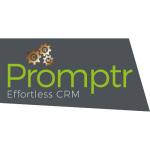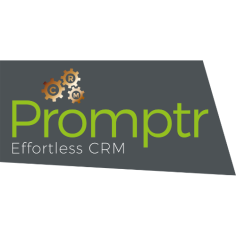Minimise the pitfalls and maximise the benefits of law firm CRMs with Promptr CRM
Law firm CRMs: Common pitfalls and how to solve them
CRMs have the potential to give your law firm massive benefits. But they need skills to manage them and support users, effort to keep adoption up and maintain your data… read more
What law firm CRM pitfalls to look out for
You have to put effort in to get the promised benefits from your CRM database. No matter what anyone tells you when you bought it, or are in the process of buying one.
Let’s go through some of the main issues and headaches to look out for, and then tips to minimise, or resolve these pitfalls.
Pitfall: Your hard work and effort starts AFTER you buy a Law firm CRM database
The easy part of CRM is signing the cheque and contract. If you are going through that, you’ll no doubt be thinking – this is a pain, I’m looking forward to getting through this stage and having the thing installed and up and running.
The up and running bit is the hard bit I’m sorry to tell you.
Users need supporting, users don’t like change. Your data needs monitoring and updating, users won’t want to do it – but will complain at the data quality if it inaccurate, you will need to continually need to offer refresher training sessions.
Bear in mind that running a CRM is a never ending task. The costs won’t stop – may well go up when you add more users and more features, and all these extras dig into your budget. Oh, and you’ll have to find someone skilled (and willing) to do this never ending task – it is unlikely to be on your headcount already.
Try this…
Find a supplier or consultant that will hold your hand, support your users and manage your data quality for your users. Everything for you – so you can do what you do best.
Pitfall: Law firm CRM user adoption
Without adoption, your project is a complete and utter failure. Far too many CRM projects are not successful.
Without adoption your lovely shiny new database is a waste of your budget, a waste of your lawyer + secretary + BD and Marketing time, and a waste of the goodwill for the BD team – which is very easy to disappear, and really hard to get back.
If you thought your CRM database was expensive (not all systems are expensive) – and ALL expensive if you don’t use them (much like some gym memberships), that’s nothing compared to wasting a lawyer’s time who you are charging out for their work at hundreds and hundreds of Pounds, Euros, Dollars etc. per hour.
Try this…
If you want to ensure you have great adoption, do something really strange… don’t ask your users to use your CRM at all. Well, what I mean is.. don’t ask them to input stuff. Only ask them to do something with the information and knowledge they are being spoon-fed by your system. Do everything else for them, or find a system and supplier that will.
Pitfall: Overly complex Law firm CRM databases
90% of CRM databases need lawyers to have some sort of PhD in IT or BD pro to get the best out of them.
This is because CRM IT systems are in a race with each other to do more and more and more. A plethora of features, pages, tabs and fields. This just makes them hard to use for the two things most users want to do.
A system with 100 fields is probably 100 too many for 99% of your users. Which means they won’t want to use it – a nice uphill struggle for you. A system with 10 fields is probably only 5 too many for a few users. Which means you’ll have a system that IS used.
It’s a bit like owning a car. If you have something like a top end Ferrari, but hardly anyone in your family can drive it (or fit in it), having a small hatchback is easy to use (and fit in), so gets used.
Try this…
Look at your users. Are they really IT whizz-kids? Unlikely. So strip everything out of your system (fields, pages, number of records) until your users start saying things like ‘Can I do….’ or ‘How do I…’ or ‘Where is….’
Pitfall: Buying your first Law firm CRM
There are loads of databases. Many aimed at the legal sector, many more are mass market.
Many do the same sort of thing, but in different colours, different words for features, and the buttons are in different places.
Bear in mind if you are looking at mass market CRMs…. They help businesses sell widgets and work on everyone using it everyday as sales people. Is that really your business?
All you need to do is work out what you really want on day one launch. Then get the supplier or consultant to simplify it before you even start. Otherwise it’ll be too scary for most of your users. No matter how intelligent and how great at their job they are. You can always expand when users get used to it.
It’s like buying a Ferrari as your first car. But then striping it down to something like a small hatchback – which is THE perfect first (or everyday) car – you can nip to the shops, take the kids to school or go on holiday in it (I stuck a roof-rack on mine). Ferraris are for showing off. They don’t pass the everyday test – they won’t fit in supermarket parking spaces and you’ll need advanced driving skills if you don’t want to pick it out of a hedge one rainy afternoon.
Do you remember your first car? All your next cars did the same, just with more stuff.
Try this…
Remove as many features and fields as possible for day one launch. Increase features as your users get used to it all.
Pitfall: Law firm CRM users having to work hard to get information
There is no point having a system that makes your users hunt for information.
Because they won’t. Or can’t.
Long term CRM adoption is what you want. No point having a Ferrari with flat tyres, a flat battery and a thick layer of dust.
Instead of hunting for information, your system should feed users with relevant information – right into their inbox so they hardly have to lift a finger
Instead of asking users to add contacts, your system should automatically add contacts for them.
Instead of asking users to tag they know a contact, get the system to do this automatically.
Can you see a pattern here?
Users aren’t being asked to do anything remotely like ‘database chores’.
Try this…
Take a moment to imagine the busiest, laziest, least IT savvy people you can. Design your system around them, then everyone else will be OK too.
Pitfall: Law firm CRM Data quality
Users will add incorrect information.
Users will add contacts that already exist in your database.
Users will complain about incorrect details in your CRM.
Users will complain about the duplicated contacts in your CRM.
Even when they added them.
Many systems look at Outlook to update the details for contacts. Great, brilliant, super idea, but not infallible.
For instance, if the supplier tells you their system automatically solves all your data problems, they are either mistaken or pulling the wool over your eyes.
You will always need someone somewhere to make sense of the automatic updates….for instance… John Smith works at ABC company and moves to XYZ company. No system can tell you this is the same person. All that happens is the old record has no further activity and a new contact is created with activity added to that one instead.
If you don’t update that record and your lawyers see it – their trust in your CRM data will drop off and you’ll hear “the details in it are old, I’m not using it”.
Users will find any excuse not to use it.
Try this…
Find a way to update the data WITHOUT EFFORT FROM YOUR LAWYERS.
Pitfall: Law Firm CRM users
Users need constant refresher training because the database isn’t their main skillset.
And don’t expect them to sit still for 2 hours. That’s a huge waste of time. Partly because they don’t need to do everything with the system, and partly because that’s a huge time investment of them not doing something else, like client work and fee earning.
Nobody likes change. Just try folding your arms the wrong way to see how difficult it is.
Nobody gets up in the morning and says “I want to use a database today” either.
Try this…
Can you get your training sessions down to 15 minutes? Do you think you can ONLY show each type of user the one or two most important things they need to know? Yes, you can, it’s just hard to get there. I speak from experience – it is worth it.



